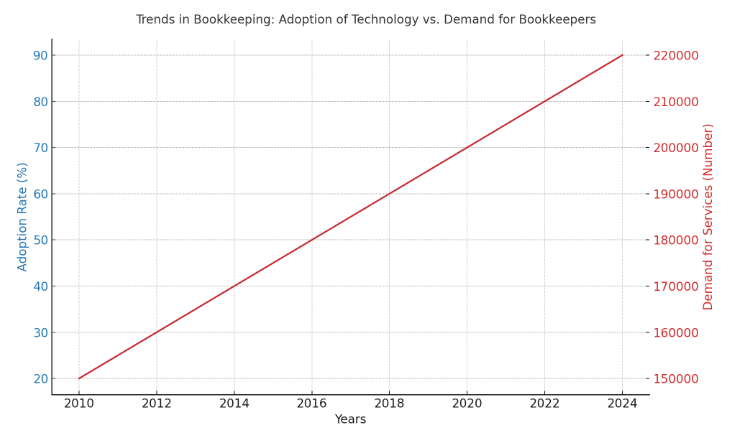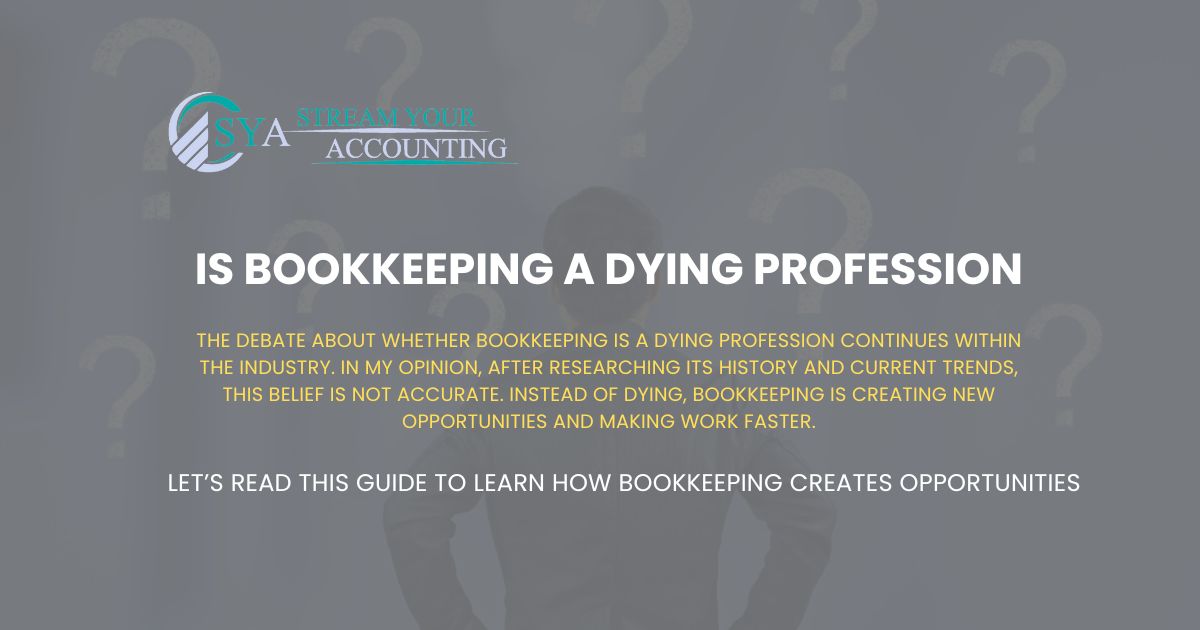Is bookkeeping a dying profession:
Quick Answer
No, the profession of bookkeeping isn’t dying. It’s actually evolving, and those who are willing to adapt will find new opportunities. The role of the bookkeeper is changing, not diminishing, with the advancement of technology. According to the Business Research Company, the global accounting service industry will be valued at $588 billion by 2021. It is expected to grow to $1.7 trillion in 2031.
In the bookkeeping industry, there is still a debate over whether or not it’s a dying career. After researching its history, and looking at current trends, I don’t believe that this is accurate. Bookkeeping does not die; it is evolving, creating new opportunities and making work quicker. The rich history of bookkeeping goes back more than 7,000 years, to ancient Mesopotamia. There were early records kept on goods received and traded that laid the foundations for modern accounting. The practice was widespread in ancient Egypt and Babylon where accurate record-keeping played a key role in managing trade and resources.
Chanakya’s Arthashastra, written in ancient India demonstrates the importance of bookkeeping for thousands of years. This text emphasizes the importance of maintaining accurate financial records. This long history should be considered when claiming that bookkeeping has died. Even though the methods have changed, bookkeeping remains essential today.
In the late 1500s, the Italian monk Luca Pacioli introduced the double-entry bookkeeping system. Pacioli revolutionized accounting with his system that recorded debits in columns and credits in another.
You will learn new ways to enhance your career as a bookkeeper by the end of this post.

Why Some People Think Bookkeeping Is a Dying Profession
It is due to misconceptions and an inability to understand the changes that have occurred within the bookkeeping field. Some people believe that bookkeeping is a dying profession. However, it’s important to understand the reasons for this belief.
1. Rapid Advancement of Technology
This belief can be attributed to the rapid technological advancement. Accounting software and automation have made bookkeeping easier and more efficient. It has been assumed that bookkeepers no longer exist. Those who are willing to learn and adapt constantly know that the bookkeeping profession is changing. Now, the role involves more analytical and strategic tasks that provide greater value to business. Bookkeepers who adopt technology can provide insights into financial trends and help with strategic planning. They can also improve business efficiency.
2. DIY Bookkeeping and Digital PR
Digital PR (digital public relations) is another factor that contributes to the perception of decline. Many businesses and individuals discuss bookkeeping on various platforms. They often offer free courses to establish an audience. Small business owners who may not have the budget to hire a bookkeeper often do their bookkeeping after taking these courses. There will be a time when you need professional guidance to help you navigate through complex financial situations. This fact highlights the need for bookkeepers to continue managing more complex financial tasks. They can provide expertise that DIY methods cannot match.
3. Misunderstanding of Evolving Roles
A common misconception is that bookkeeping is only about data entry. This misperception fuels the belief that the profession is in danger. Modern bookkeeping is much more than simply recording transactions. Financial analysis, budgeting and advice on financial strategy are all part of modern bookkeeping. These expanded roles demand a higher level of skill and give bookkeepers the opportunity to make a significant contribution to a company’s success.

Shifting the Mindset: Bookkeeping is Evolving, Not Dying
It’s important to highlight several key aspects that demonstrate the enduring and evolving nature of bookkeeping in order to change the minds of those who think it is a dying career. This section contains a graph and insights to help you understand the current trends in bookkeeping.
1. Embrace Technological Advancements
Learn New Tools: Promote the use of cloud-based accounting software like QuickBooks, Xero and other modern bookkeeping tools. These tools automate routine tasks, allowing bookkeepers to spend more time on complex activities.
Automation is an asset: Do not view automation as a threat but rather as a way to improve the efficiency and accuracy of bookkeeping tasks. Automating repetitive tasks allows bookkeepers to concentrate on strategic and analytical tasks.
2. Expand Skill Sets
Financial Analysis and Advisory: Develop skills in forecasting, financial analysis and strategic planning in order to provide more value-added services that will position bookkeepers at the forefront of financial decision-making processes.
Continue your education by taking courses, obtaining certifications and staying up to date with industry trends. Bookkeepers can remain current and adapt to changing business needs with the help of Continuous Education.
RECOMMENDED: Will Accounting be Automated? Latest Guide
3. Highlight the Importance of Human Expertise
Complex Financial Situations: Human judgment and expertise are often required in complex financial situations, which machines can’t fully duplicate. Bookkeepers are able to understand financial details in a way that automated systems cannot.
Bookkeepers should emphasize the importance of tailored financial solutions and personalized advice to clients. This personal approach will help you build trust with your clients and maintain long-term relationships.
4. Adapt to Changing Business Needs
Specialization: Concentrate on niche areas, such as ecommerce, real estate or specific accounting software, to become an expert. Specialization makes bookkeepers more valuable and differentiates them from other professionals.
Advisory Services: Helping businesses to interpret financial data and make informed decisions. Advisory Services extends the traditional role of bookkeepers.
5. Promote the Role in Business Growth
Strategic Partner: Make bookkeepers strategic partners for business growth. They can help companies identify and navigate financial challenges as well as opportunities. Effective bookkeeping has a significant impact on a company’s decision-making and financial health.
Business Development: Effective accounting can improve cash flow management and financial reporting. It will also boost your company’s overall health. These benefits can help change the perception of bookkeeping.
6. Educate Clients and the Public
Run awareness campaigns to inform clients and the general public of the changing role of bookkeepers, and the importance of professional accounting in the success of businesses. Awareness campaigns can help dispel myths about the profession and bring it to light.
Showcase success stories and real-life examples of how professional bookkeeping benefits businesses. Real-life examples demonstrate how professional bookkeeping has clear benefits.
7. Networking and Community Building
Professional Networks: Join industry associations and groups to exchange ideas and best practices with your peers. The networking process can be a valuable tool for advancing your career.
Mentorship: Participate in mentoring programs to assist new bookkeepers to develop their skills and to adapt to changes within the industry. Mentorship helps to build a network of support and improve the profession.
RECOMMENDED: What are the Current Accounting Trends? Ten Trends to Pay Attention
8. Graph Analysis: Bookkeeping Trends and Opportunities

The graph shows that there is a clear trend. While the demand for bookkeepers has remained constant, the adoption of software and automation is on the rise. The graph indicates that the bookkeeper’s role is not decreasing but changing. Those who embrace technology and expand their skill set will succeed in the changing landscape.
Focusing on these factors can help individuals and companies shift their mentality and realize the relevance and potential that bookkeeping continues to have. The profession is not dying; it’s evolving and offering new opportunities for those who want to improve and adapt.
Final Thoughts
Is bookkeeping dying? It is not. The demand for bookkeepers is strong, even though the field has evolved with the advancement of technology. According to the Bureau of Labor Statistics, there is steady growth of 6.2% in employment between 2022-2032 in the need for Bookkeeping and Accounting professionals. By embracing new technologies, expanding their skills, and focusing on strategic roles, bookkeepers can uncover new opportunities and continue to be crucial to business success. Bookkeeping is adapting, not disappearing, and offers promising prospects for those who stay current and innovative.


